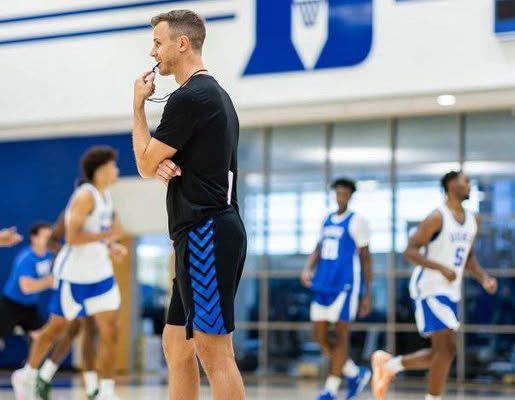Inside the halls of Cameron Indoor Stadium, where history echoes off every brick wall and hardwood panel, a subtle yet seismic shift has taken place. No banners were hung, no statues unveiled, but those who follow Duke men’s basketball closely understand the magnitude of what is unfolding. In the post-Coach K era, skepticism ran thick. Replacing a legend is never a straightforward task, and in Mike Krzyzewski’s case, the bar for legacy was stratospheric. But Jon Scheyer, the former Duke captain turned head coach, has not just taken over a team—he’s reconstructed a culture. Now, two seasons into his tenure, Duke fans are talking, not in whispers of concern but in anthems of belief. The Brotherhood, once defined by Krzyzewski’s leadership, is being reborn under Scheyer’s meticulous watch, and it has the entire college basketball world on notice.
Scheyer has done something few imagined possible—he has honored the past without being imprisoned by it. In the early months of his head coaching career, he leaned into the familiarity of what Duke had always been: a program grounded in discipline, athleticism, and high-IQ basketball. But soon, it became apparent that he was not interested in being a caretaker of tradition. Instead, Scheyer began carving out a new path, one steeped in modernity and player empowerment, yet rooted in the same relentless pursuit of excellence that defined the Krzyzewski era.
One of the most visible changes has been in how players relate to the program. Under Coach K, Duke was a place where structure reigned. It was a system players entered and adapted to. With Scheyer, the dynamic has shifted—players are co-creators in the system. Scheyer encourages feedback, collaborative adjustments, and personal expression. This cultural transformation has allowed young stars to feel invested in the program in ways that transcend court performance. The result has been a roster not only committed to winning but deeply engaged in the process of team-building.
The shift in tone is most evident during practices, where Scheyer’s presence is less authoritarian and more collaborative. That doesn’t mean there is any slack in expectations. On the contrary, the bar remains high, but the method of reaching it has changed. Scheyer mixes old-school fundamentals with new-age flexibility. Rather than barking directives from a distance, he is often seen participating in drills, offering individual coaching, and fostering an environment where questions are welcome. The players respond with intensity, knowing their voices are valued and their individuality respected.
Recruiting, always a lifeblood of Duke basketball, has taken on a new flavor as well. Scheyer, still just in his mid-30s, relates more directly to the social media era prospects who now dominate the high school landscape. His presence on Instagram and X (formerly Twitter) feels authentic, not manufactured. When top-tier recruits like Cooper Flagg, Isaiah Evans, and Khaman Maluach speak about Duke, they talk about feeling “seen” and “understood.” That’s not just PR spin; it’s evidence of a culture where the pitch isn’t just about banners and NBA pipelines, but about human development, belonging, and legacy.
Yet culture alone doesn’t sustain a program—winning does. And Jon Scheyer has proven he can win. In just his first two seasons, he’s compiled a remarkable record, led the team to deep tournament runs, and secured a conference title. More importantly, he’s shown an uncanny ability to make in-game adjustments, earn trust from veterans, and prepare his freshmen to contribute immediately. The playbook is flexible and fast-paced, but never sloppy. Defense is emphasized with the same vigor as it was in the 1990s, but the offense now incorporates modern spacing, movement, and shooting principles reflective of today’s NBA.
Behind closed doors, alumni speak glowingly about the new energy Scheyer has infused into the program. Former Duke greats like Grant Hill, Jay Williams, Shane Battier, and J.J. Redick have all returned to campus more frequently, not as ceremonial figures but as active mentors. The Brotherhood, once more of a branding slogan, has become an operating principle. There are player development seminars, networking opportunities, and mental health resources. Scheyer understands that a player’s identity cannot be reduced to stats and accolades, and this holistic approach has created unprecedented buy-in.
Even Cameron itself feels different. The student section is louder, more engaged, and, interestingly, more diverse. Scheyer’s broader community initiatives—ranging from local youth basketball camps to social justice forums—have opened Duke up to voices long overlooked. The walls of the hallowed stadium may remain the same, but the soul of the program now pulses with new life.
It’s not lost on anyone that the road ahead remains steep. The ACC is a gauntlet, and rivalries are as fierce as ever. Carolina is still dangerous, and programs like Miami, Virginia, and Florida State continue to nip at Duke’s heels. But what distinguishes Scheyer’s Duke isn’t just that it’s competing—it’s evolving. And that evolution is what has energized a fanbase that once feared stagnation or decline. Scheyer has built a bridge from the program’s past into its future, and he has done so without compromise.
Perhaps the most important indicator of Scheyer’s success is not found in the stat sheets, but in the language players now use. Words like “home,” “family,” and “growth” appear with increasing frequency in player interviews. Recruits aren’t merely citing NBA potential as their reason for choosing Duke; they’re talking about mentorship, accountability, and culture. That kind of shift can’t be faked. It has to be lived, breathed, and demonstrated every single day.
Duke basketball under Jon Scheyer isn’t just surviving the transition from the Krzyzewski era—it’s thriving because of it. In choosing to lead with authenticity, Scheyer has cultivated trust. In modernizing without erasing the past, he’s honored the tradition. And in empowering his players, he has reminded the world that greatness in college basketball isn’t solely about who’s on the bench—it’s about who’s bought in. Inside the Brotherhood reborn, the future isn’t just bright—it’s electric.



